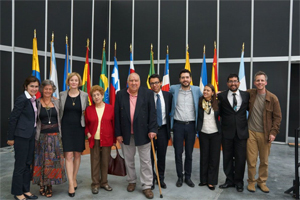
The legal team with Don Leopoldo Garcia Lucero, his wife Elena and the members of the Inter-American Commission on Human Rights
Two University of Essex-based lawyers and their students have helped leading human rights organisation REDRESS secure a landmark judgement upholding the right to justice and reparations for exiled torture survivors from Pinochet-era Chile.
This is the first time the Inter-American Court of Human Rights (IACHR) has decided the case of a living survivor of human rights violations under General Augusto Pinochet’s dictatorship, and in particular, someone who has been subject to torture and forced exile.
The claim was brought by UK resident Leopoldo García Lucero, who was tortured and arbitrarily detained under the Pinochet regime and has been living in London with his family since he was expelled from Chile in 1975.
REDRESS, the leading international Non-Governmental Organisation (NGO)) advocating for the right to reparation of torture victims, acted for Mr Garcia Lucero with support from legal experts at Essex Clara Sandoval, from the School of Law and Director of the Essex Transitional Justice Network, and Lorna McGregor, Director of the Human Rights Centre.
Gabriela Echeverria, now a PhD student at Essex, filed the petition in the case in 2002 before the Inter-American Commission on Human Rights, when she was legal advisor at REDRESS.
• Leopoldo García Lucero and his wife, REDRESS director Carla Ferstman, Lorna McGregor and Clara Sandoval will discuss the case at a public debate at the University of Essex on Tuesday 19 November, 3-5 at TC1.10 as part of our Latin America Week: 'Chile 1973-2013: Memory, accountability and reparation'
The full details of the case can be read on the REDRESS website
Clara and Lorna worked closely with the REDRESS legal team including lawyers Karinna Fernandez and Juan Pablo Delgado to prepare for the hearing. They also created a team of students who supported their preparations for the hearings including victim testimonies, expert witnesses, cross examinations and final pleadings.
Clara and Lorna said: ““This significant judgment upholds the right to justice and the right to reparation for torture survivors of Pinochet’s dictatorship despite the passage of time and the fact that they are away from Chile.
“It has brought back the hope of Mr Garcia and his family that he might not die without seeing the perpetrators of his torture being identified and punished. The judgment also reminds us that there is an unfinished business with justice and reparation in Chile; one that litigators should continue to engage with as the Court has provided Chile with a new opportunity to continue investigating, prosecuting and punishing the perpetrators of his torture in a diligent way, and ensuring that domestic remedies to challenge reparations for victims of the dictatorship are adequate and effective.
“As such, our work as part of REDRESS legal team does not finish here. There is a lot to be done now to get Chile to comply with the judgment and to take the necessary steps to ensure that all victims of the dictatorship can exercise their right to justice and to adequate, prompt and full reparation before they die in Chile.”
Josephine Wragge, who completed her LLM International Human Rights and Humanitarian Law at Essex this year, was part of the Essex student team. She said: “I really loved working in the team: the motivation and capabilities of the fellow students, constantly learning and growing with the amicable, knowledgeable and inspiring guidance of the instructors, as well as contributing to an endeavour which could, if successful, make a real difference in the victims' lives.”
It is estimated that around 200,000 Chileans were forced into exile and over 38,000 survived torture during the Pinochet dictatorship (1973–1990). In his claim, 80-year-old Leopoldo García Lucero argued that 40 years later, no-one has ever been prosecuted and punished for his torture and arbitrary detention, and that Chile did not initiate an investigation into his case until 2011.
Mr García Lucero – who has been living in London with his wife and his three daughters since he was expelled from Chile in 1975 - also claimed that the pension he has been receiving from Chile, arising from the loss of his job during the dictatorship, was insufficient to cover his needs in exile. In addition, he argued that he and his family have been unable to benefit from the health and education reparation programmes available to victims in Chile.
Carla Ferstman, Director of REDRESS, said: “We welcome the judgment, as it recognizes that torture survivors in exile today, like Mr García Lucero, still have the right to justice and reparation, despite being outside of the country and regardless of the passage of time.
“The judgment offers some hope to the many who may find themselves in the same situation. These are particularly vulnerable victims who have been denied justice for many years.”
Mr García Lucero said of the judgment: “No amount of money will ever be able to compensate the suffering that my family and I have endured, but I am glad that the judgment recognizes that Chile could have done more for victims like us. I also hope the judgment will help prevent similar events from happening in the future, and that Chile finds and punishes those responsible for my torture and exile before I die, so I can live to see justice done.”